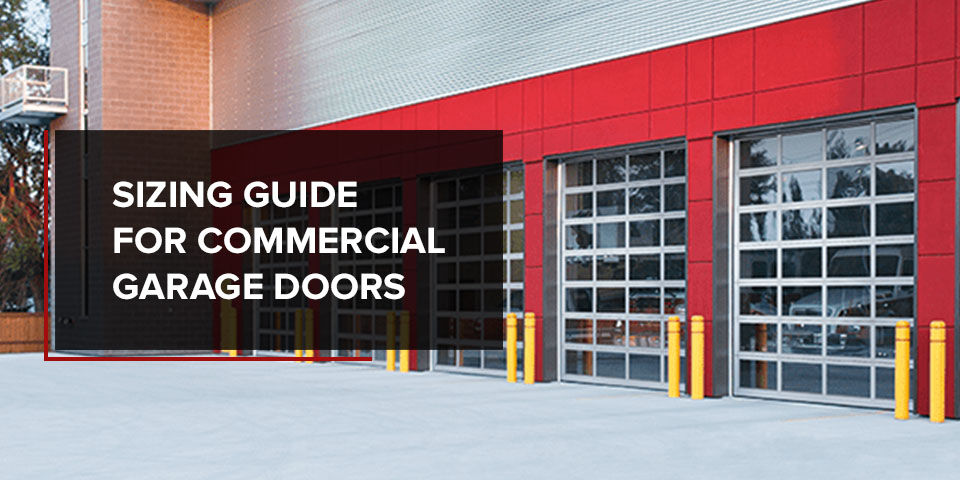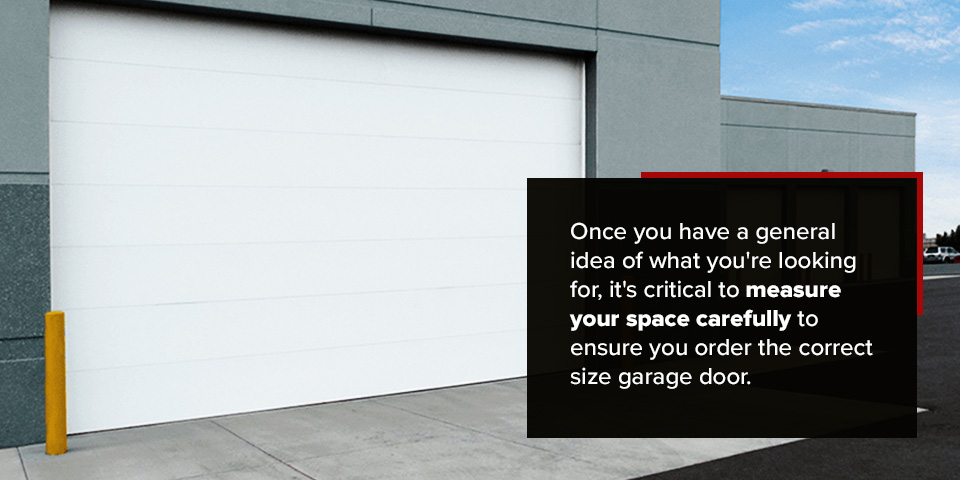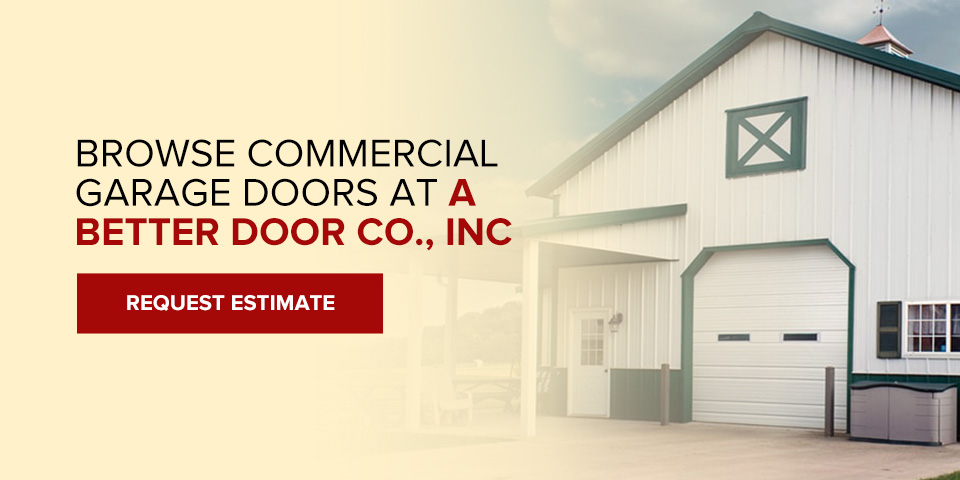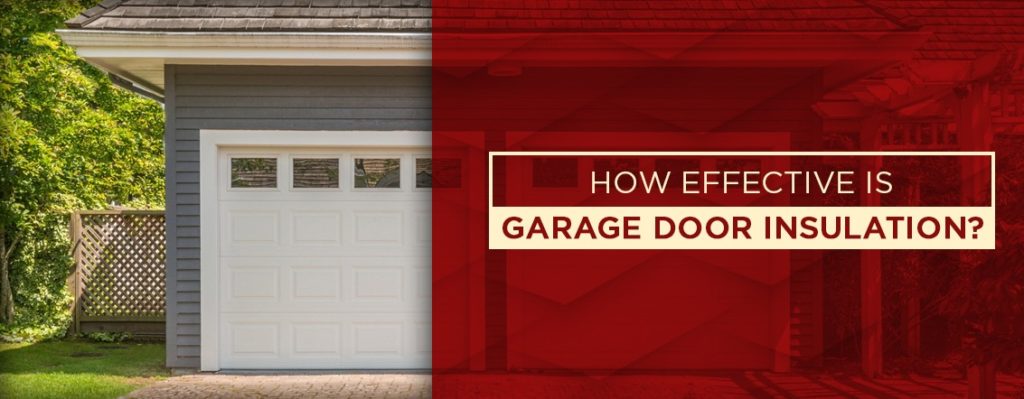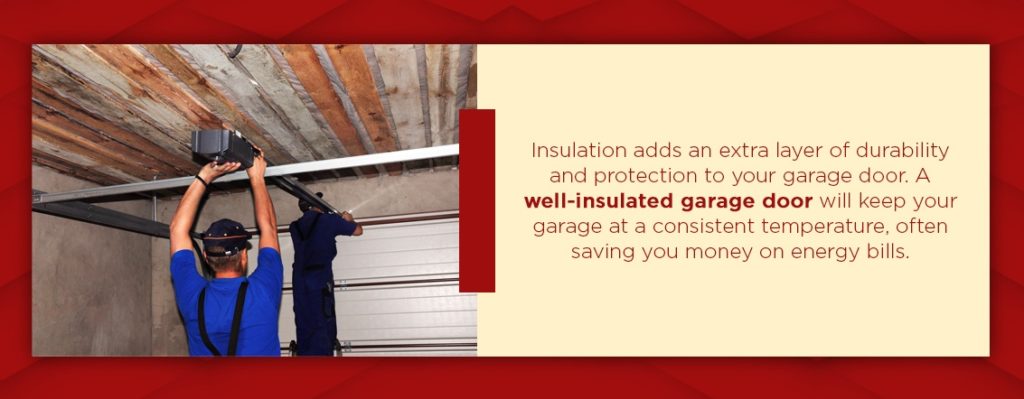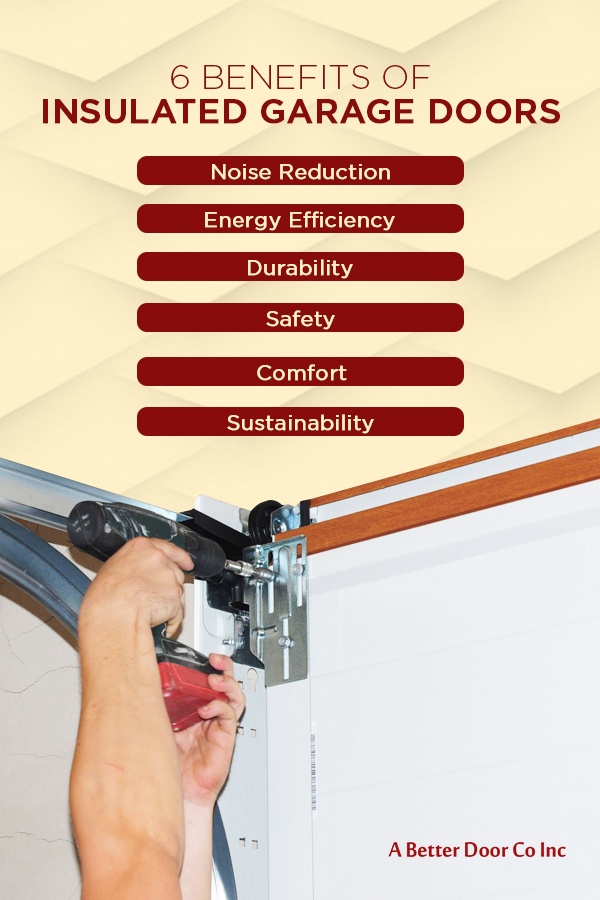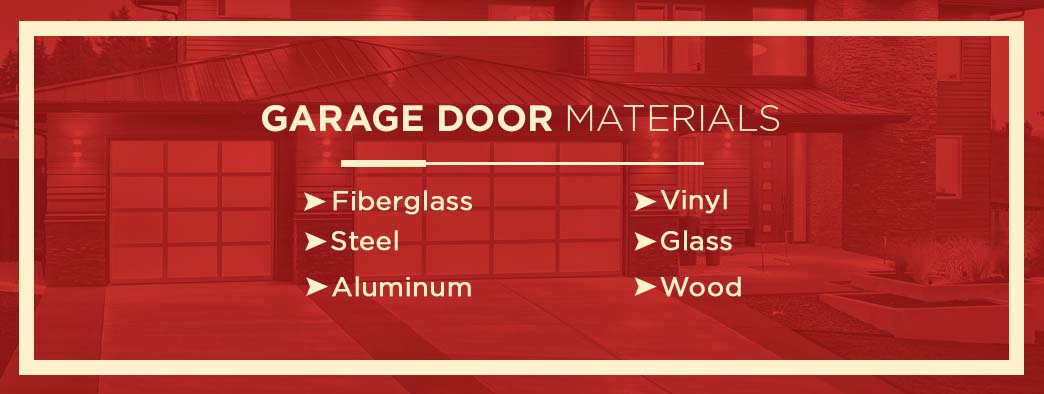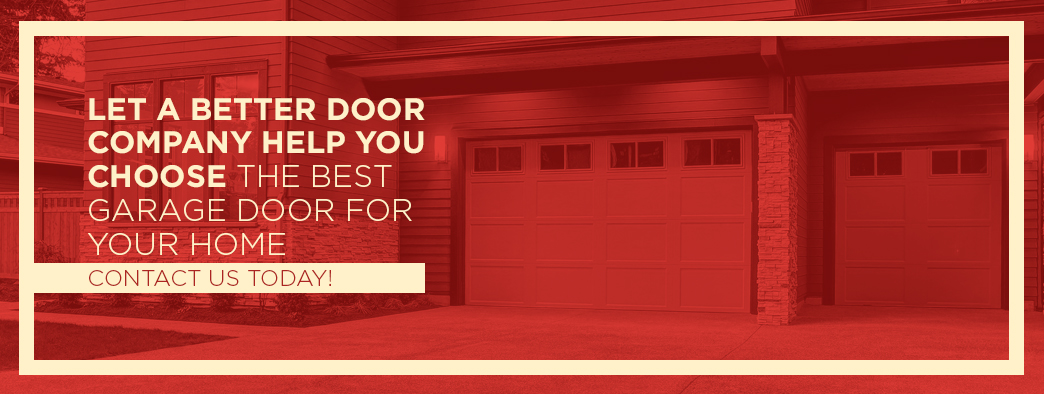Garage Door Style Guide
A garage door is a significant investment. It can make your home more energy-efficient, help with security and add value to your property. Your garage door also affects your home’s exterior and curb appeal.
One of the main benefits of garage doors is that they are highly versatile when it comes to design. There are several types of garage door materials, operating types, decorations, colors and finishes to suit a wide range of aesthetics. Whether traditional or contemporary, rustic or modern, the right garage door plays a pivotal role in completing your home’s exterior to reflect your design preferences.
Table of Contents
- Different Garage Door Styles
- Common Garage Door Materials
- Important Functional Features for Garage Doors
- Considerations for Choosing the Right Garage Door Style
- Frequently Asked Questions for Choosing the Right Garage Doors
- Residential Garage Doors for Any Style at A Better Door Co., Inc

Different Garage Door Styles
With this garage door style guide, you can explore the various design choices for garages and find the style that best suits your exterior:
Traditional
Traditional-style garage doors provide a classic and timeless look that can suit many exteriors. They generally highlight old-world and colonial architecture and are often made of wood or steel. With steel, the finish may resemble wood to give it a more traditional appearance.
For traditional garage doors, you may see some of the following styles and design elements:
- Raised panels: Raised panels are the epitome of a traditional door. You often see details cut into the perimeter of each thick panel and beveled edges framing them to create a sophisticated look. Raised panels work exceptionally well in earthy or bold colors that highlight their design features.
- Symmetry: Traditional garage doors highlight symmetry for a simple, balanced aesthetic.
- Colors: Traditional garage doors work well in neutral and earthy colors like brown, beige, white, and shades of gray. Rich, dark shades like mahogany and black work well too. However, traditional garage doors may come in various colors to suit a home’s exterior.
- Decorative glass windows: Windows are not a staple feature of traditional garage doors but an optional design element that suits them well. When they have windows, they often include decorative glass or simple framing panels.
Modern
The design of modern garage doors showcases minimalism with simple, clean lines and streamlined designs. Compared to more traditional styles, modern doors don’t have many decorative features. They usually come in neutral or bold colors, ranging from white and gray to bold black and striking bronze. These garage doors come in various materials that work well for a modern look:
- Aluminum: Aluminum is excellent for creating a minimalistic, contemporary look.
- Steel: For a contemporary design that is sleek and eyecatching, steel is ideal.
- Glass: Using large glass panels creates a modern aesthetic that celebrates natural light and open spaces.
- Composite: Like traditional designs, modern garage doors showcase natural materials and earthy palettes. Composite materials can mimic some of the features of natural materials, like wood, while prioritizing clean and simple lines.
Many modern-style garage doors will also have features like quiet operation, customizable options and integrated technology for enhanced safety and convenience. However, most new doors can be integrated with smart technology, regardless of their style.
Contemporary Design
There is quite a bit of overlap between contemporary and modern design. However, contemporary design is far more fluid and flexible, as it highlights current trends. For garage door styles, this can translate to several designs. Contemporary doors may also have crisp, minimalistic lines and natural elements, but they can also incorporate features of Art Deco and global trends.
Contemporary garage door styles may include bright, popping colors like turquoise and yellow. They may also have glass and stainless steel elements, as well as ornate details and geometric patterns.
Rustic
Rustic designs emphasize some of the same features as traditional ones. Both emphasize simplicity but highlight it in different ways. Some of the features and design elements of rustic garage doors include the following:
- Natural materials like wood and metal or composite materials that mimic natural ones well.
- Materials left in a rough or raw state. Though the materials are finished for quality purposes, it highlights natural imperfections and the authenticity of the materials instead of covering them up.
- Color palettes that you would see in nature — including browns, sage and gray — and colors that are muted or have a weathered appearance.
- Handcrafted finishes.
Carriage House
A carriage house garage door is a design that specifically resembles the old traditional doors of garages for horse-drawn carriages. These garage doors have a larger-than-life charm that is evident in several key features:
- Swing-out or sectional doors: Older traditional carriage house garage doors would swing outward. While you may still find these designs, there are variations and modern versions, like sectional doors that roll up. These doors provide an old-world aesthetic while prioritizing convenience and space.
- Decorative features: To add to their captivating charm, carriage house doors often feature decorative elements like ornate wrought iron handles, hinges and clear or frosted windows.
- Wooden aesthetic: Most carriage house garage doors are made from wood or wood-like finish to suit the picture of an actual carriage house. Wooden carriage house garage doors are often stained to underscore the natural grain of the wood. If using paint, natural and neutral colors are ideal. Rich tones are also suitable, especially for accents and framing panels.
- Grand appearance: Carriage house doors are perfect if you want a strong, visual entrance. They are large and give your garage a substantial and captivating appearance.
Tudor
A Tudor-style house reflects medieval and Renaissance motifs from English and Welsh architecture. Tudor-style garage doors embody the style in several ways:
- Angular designs: Garage doors may have decorative gables or incorporate other angular designs to reflect the gabled roofs in Tudor architecture.
- Arches and detailed panels: Decorative paneling and grand arches are excellent ways to evoke the grandeur and charm of Tudor styles.
- Decorative elements: Wrought iron handles and hinges and mullioned windows add medieval charm that matches Tudor architecture.
- Wood or composite: Wood and composite materials are the best choices for showcasing the traditional craftsmanship characteristic of Tudor styles. The materials are often stained or painted in grand colors.
- Rich tones and natural finishes: Tudor-style doors are often painted in bold, regal colors like burgundy and dark greens, which complement the overall aesthetic.
- Grand proportions: Tudor-style houses typically have a robust, grand appearance and scale. Garage doors can reflect this by showcasing stature and a robust feel.
Ranch
Ranch-style garage doors complement ranch-style homes with wide profiles and functional features. Ranch-style garage doors will often have the following characteristics:
- Sectional operation and wide openings: Sectional doors roll upward, maximizing space and emphasizing the profile of ranch-style homes. Wide openings can also help achieve the same function.
- Plain paneling: Ranch-style doors may have flat or raised panels, clean lines and very little intricate detailing. Simple panels easily reflect the straightforward, functional and minimalistic design of many ranch homes.
- Sturdy materials: To embody a ranch’s robust nature, doors may be made from sturdy, practical materials like wood, steel and vinyl.
- Colors and accents: Ranch-style garage doors usually complement the rustic feel of ranch homes. Earthy tones and neutral colors enhance the balance between their simplicity and robustness.
- Grand windows: Ranch homes highlight open spaces, and grand windows reflect this in garage door design. Ranch-style garage door windows may be large and modern or have simple grid patterns.

Common Garage Door Materials
Common garage door materials play a vital role in both function and style. Here are three of the most common materials for garage doors:
- Steel: Steel doors are sturdy, low-maintenance and versatile in style. Steel doors are extremely well-suited to modern and contemporary styles. For a modern style, keep steel garage doors sleek and minimalist with large glass inserts. For a more contemporary style, highlight bold colors and textured finishes. Some steel doors are available in wood-like finishes for a natural look with less maintenance.
- Wood: Wood garage doors are popular and reliable. They are durable and timeless, adding warmth, beauty and charm to exteriors. Wood is ideal for traditional, rustic designs, carriage houses, Tudor and ranch aesthetics. Finishes can be sophisticated, simple, natural or bold. Similarly, accents can be clean and streamlined or ornate to match the design.
- Aluminum: Aluminum doors are adaptable and practical, allowing them to suit various styles, from traditional and farmhouse to Art Deco contemporary.
Important Functional Features for Garage Doors
Regardless of the style door you opt for, these vital, functional features are important to consider:
- Insulation and energy efficiency: Garage doors must be well-insulated to ensure a more energy-efficient home, as they are one of the largest entrances in a house’s structure. A well-insulated garage door will help seal your home from cold or hot air so your air conditioning works less hard and saves on energy costs. Both steel and wood garage doors can offer excellent insulation. You can also upgrade different styles of doors to enhance insulation and improve energy efficiency.
- Security and safety features: It is vital that your garage door is equipped with up-to-date security and safety features. Safety features ensure that the garage door will not cause damage to property or physical harm by opening and closing unexpectedly. Security features include integrated alarm systems that help guard your property.
- Smart technology: Various smart technology options can help make your garage more convenient, efficient, and secure. With integrated software like Wi-Fi garage door openers and apps, you can operate and monitor your door remotely.

Considerations for Choosing the Right Garage Door Style
Consider these easy-to-apply tips for choosing a garage door that will complete your home:
- Compatibility with the existing exterior: Part of your garage door’s value is that it can create cohesion, curb appeal and a streamlined exterior. To achieve this, ensure the design you choose integrates well with existing features.
- Functionality: Space requirements for your building and considerations for your vehicle sizes can factor into design choices.
- Budget: The more sizable, decorative and technological a garage door is, the more it will cost. There are options to suit different budgets, so you can find a style that meets your needs.
- Professional advice: It can be highly beneficial to contact a garage door expert to help you choose the best style for your home. A professional will understand which materials, operating styles, sizes and designs suit your exterior.
Frequently Asked Questions for Choosing the Right Garage Doors
Exploring the answers to the frequently asked questions can help you gain a better understanding of which garage door will suit your home best:
What Is a High-Lift Garage Door?
A high-lift garage door or vertical lift garage door is part of an overhead garage door system that lifts higher than standard doors. This additional height provides sufficient vertical clearance for vans, trucks and other high-clearance vehicles. This type of garage door design is compatible with sectional doors, tilt-up doors and rolling doors. These doors suit ranch-style homes particularly well.
How Are Garage Doors Measured?
Sizing and measuring are vital to choosing the right garage door for your exterior and your preferred aesthetic. While you can measure a garage door on your own, having a professional come out ensures greater precision. A professional will also be able to determine if other factors may affect sizing. An expert will measure the width and height of the garage door opening, side room, headroom, backroom and floor-to-header.
How Much Do Garage Doors Weigh?
Most residential garage doors weigh approximately 200 pounds. Design, size and materials all factor into how much the door may weigh.
How Wide Are Single-Panel Garage Doors?
Various standard sizes for single-panel garage doors are available, including 7, 8 and 9 feet wide. Each suits different properties, styles and garage sizes well.
Residential Garage Doors for Any Style at A Better Door Co., Inc
Understanding the different types of garage door styles and options can help you decide what will work best for your home. With the right garage style, you can enjoy a functional garage door while adding valuable curb appeal to your home.
If you’re unsure what style door would best suit your property, you can reach out to professional garage door specialists. A Better Door Co., Inc is a family-owned and operated business that installs and carries a range of garage doors for various residential preferences. Our residential garage doors include modern glass and aluminum, wood, and steel options. Feel free to browse our selection of garage doors now or contact us online to request an estimate.
Advantages to Upgrading Your Garage Door
Advantages to Upgrading Your Garage Door
Ever glanced at your home and felt something was off? Maybe it’s time to shift your attention to your garage door. Upgrading it is a wise investment with multiple benefits that extend beyond aesthetics. Here’s why upgrading might be the best home improvement decision you’ve yet to make.
Top Reasons to Upgrade Garage Doors
Think of a garage door upgrade as a home upgrade. Here’s why:
1. Elevated Curb Appeal
A stunning garage door makes a significant difference to your home’s exterior. With a stylish new door, your house becomes instantly appealing to buyers and visitors.
2. Increased Security
Modern garage doors have enhanced security features, helping your vehicle and other stored items remain protected from theft and damage.
3. Improved Insulation
Feel the difference inside. Modern doors enable better temperature regulation, leading to increased energy efficiency.
4. Smooth Operation and Reduced Maintenance
Tired of that creaky noise every time you open or close the garage? Modern doors run smooth and quiet. It also requires less maintenance than their older counterparts, saving you time and money in the long run.
5. Smart Investment
When considering home improvements, think beyond immediate needs. An upgraded garage door adds to your property’s resale value. It’s a decision that pays, both in daily satisfaction and potential financial returns.
Types of Garage Doors
When you consider garage door upgrade ideas, the choices might seem overwhelming. At A Better Door Co., Inc, we proudly offer Clopay® brand garage doors that perfectly meet your style and needs. Some of our selections include:
Canyon Ridge Collection
These faux wood doors, made of durable steel and realistic molded composites, come in various designs, from Canyon Ridge® Carriage House — 5-Layer and 4-Layer — and Canyon Ridge® Modern styles to the unique Canyon Ridge® Louver design. You can customize them with multiple finishes to achieve a truly distinctive appearance.
Classic Collection
Embrace timeless elegance with Clopay’s Classic Collection. These traditional raised-panel garage doors are customizable in size, window inserts and specialty glass. Whether you prefer Classic™ Steel or the Classic™ Wood series, these doors enhance your home’s aesthetic.
Reserve Collection
Elevate your home with the handcrafted excellence of the Reserve Wood collection. Opt for the Reserve® Wood Modern series for a sleek fusion of wood and aluminum or the Reserve® Wood Semi-Custom for a historical touch with contemporary flair.
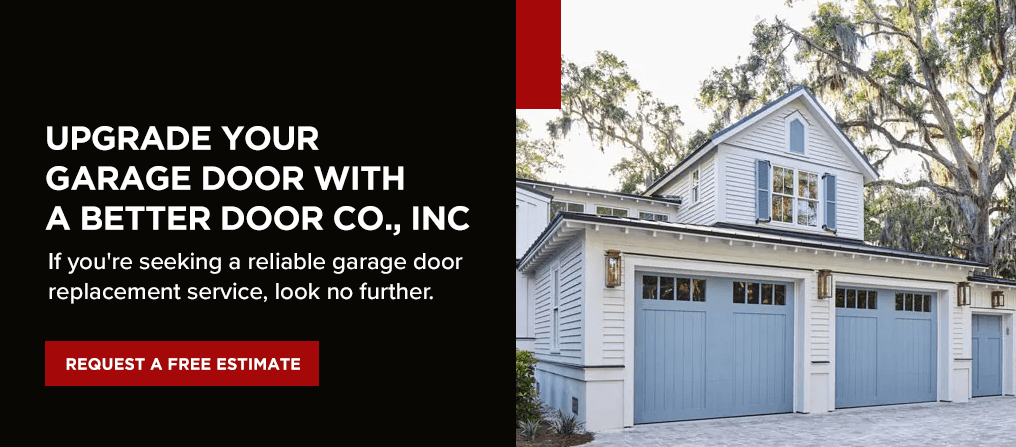
Upgrade Your Garage Door With A Better Door Co., Inc
If you’re seeking a reliable garage door replacement service, look no further. A Better Door Co., Inc, accredited by the Better Business Bureau, is committed to guiding you through the process. From helping you purchase a new garage door to ensuring its seamless installation, we’ve got you covered. Contact us for a free estimate.
Sizing Guide for Commercial Garage Doors
Commercial garage doors are essential to maximize efficiency and provide safe and convenient entry to your facility. But purchasing a new door isn’t as simple as choosing the first one you see in a showroom. To get the most out of your door, you must consider what size will fit your property best to get the most out of your door.
You might also consider the type of commercial garage door you want, its placement and the style and materials that will fit the rest of your facility. We’ve compiled this commercial garage door sizing guide to help you purchase the door best for your industry needs.
How to Choose the Right Size Garage Door
While commercial garage door sizes vary by door type, the standard tends to be around 30-32 feet wide and 24-28 feet high. As you consider your options, there are a few factors that can help you find what’s right for you, including:
- Garage placement: Think about where your garage is in relation to the rest of your facility. Is it attached or separated? Depending on the garage’s physical location, you might need a different size or style of door.
- Garage capacity: How many vehicles can fit inside your garage? Some facilities can house a few regular-sized vehicles, while others need space for several large trucks. Consider these possibilities when choosing the right commercial garage door. You’ll need an entrance large enough for your vehicles to enter and exit safely.
- Function: How you use your garage space can also influence what size of door you need. You might have fewer options available if you need a door with specific features. You’ll also need enough space for your vehicles to enter your garage with any loads they’re carrying.
Our commercial garage door sizing options allow standard-size trucks to drive in and out easily and safely. You might benefit from installing custom-sized commercial garage doors if you anticipate larger trucks or equipment accessing your property.
How to Measure for a Garage Door
Once you have a general idea of what you’re looking for, it’s critical to measure your space carefully to ensure you order the correct size garage door. You’ll need the following measurements:
- Height: Measure the height of the door opening from the highest to the lowest point. Take note of uneven floors and other irregularities.
- Width: Measure the width of your garage door opening from left to right. Note any irregularities, like wood framed jams that aren’t level or square.
- Backroom: You should also ensure you have enough backroom to install an automatic door opener. The backroom is the space between the door and the nearest obstruction past the opening. Doors on 2-inch tracks need space equal to their height plus 23 inches, while doors with 3-inch tracks need their height plus 25 inches.
- Sideroom: You’ll need enough space on either side of the door for the track brackets and springs. Standing inside the garage, measure from the side of the opening to the nearest obstruction to ensure you have at least 3 ¾ inches of clearance.
- Headroom: Your headroom — the distance between the top of your garage door and the ceiling’s lowest point — will determine what springs and tracks will fit in your garage. Since various factors can affect the clearance you need, it’s best to consult with a professional dealer to determine how much headroom you have. You can also use a low-headroom kit to increase your options.
Because there are so many styles of commercial garage doors with distinct sizes and requirements, it’s best to let a professional garage door installer help you find the door and opener suitable for your particular space. If you don’t have standard-size door openings, you can check with your local dealer or retailer about custom sizes.
Our Industrial Garage Door Sizes and Types
Understanding the different sizing options for commercial garage doors can help you find the style that fits your facility. Overhead doors offer exceptional security, weather resistance and enhanced energy efficiency. A Better Door Co., Inc offers various styles and sizes of Clopay commercial overhead doors to meet your needs.
Discover the benefits of the different types and sizing options for commercial garage doors below:
1. Rolling or Coiling Commercial Garage Doors
Rolling or coiling commercial garage doors are popular options for many businesses because they are easy for employees to open and close. Because they are made of steel, they provide optimal security and resilience against extreme weather conditions. They are also highly durable and long-lasting compared to other garage door types.
Our rolling and coiling doors are constructed from 26 gauge by 24-inch wide sheets of steel roll. They come in widths from 12 to 20 feet and heights of 14 to 18 feet. Formed with internal grooves hemmed together for one continuous sheet, they also save you space. These commercial garage doors also feature the following:
- Self-lubricating curtain wear stripes to prevent metal-to-metal contact
- A flexible bottom weatherstrip to ensure the correct fit along uneven floors
- A durable, heavy-duty bottom bar to withstand external temperatures and conditions
These doors come in various gauges and colors and work best in smaller warehouses or self-storage facilities where security is crucial.
2. Sectional Ribbed Steel Garage Doors
Sectional ribbed garage doors are durable and come in various patterns and gauges, with or without insulation. While they’re ideal for high-traffic areas such as loading docks and distribution centers, they combine reliability and performance for various industrial applications.
The ribbed look of these commercial garage doors can add a design element to your facility’s aesthetic. They also come in flush or raised panel designs in varying colors and windows. Sectional ribbed commercial garage door size options range from 20 to 26 feet wide and 16 to 24 feet tall.
3. Aluminum and Steel Full-View Doors
Aluminum and steel full-view doors are a pleasing addition to any commercial space. These garage doors invite natural light into your warehouse, office or indoor-outdoor space — many car dealerships, firehouses, restaurants and modern commercial retail spaces utilize these gorgeous garage doors. You can also add insulation for extra energy efficiency.
You have various sizing options for this style of door:
- Aluminum frames are 20 feet high with widths of 20 to 24 feet.
- Steel frames come in widths of 18 to 20 feet and heights of 16 to 18 feet.
4. Insulated Commercial Garage Doors
We provide commercial garage doors with insulation to improve your facility’s energy efficiency and protect it from severe weather conditions, extreme temperatures and moisture. Insulated doors can also help keep noise out. They are ideal for warehouses, loading docks and agricultural and industrial facilities.
These commercial garage doors offer durability and energy efficiency. Their polystyrene insulation helps reduce heating and cooling costs and provides years of reliable service. Available sizes range from 16 to 26 feet wide and 16 to 20 feet high.
If your facility requires optimal climate control, insulated doors with Intellicore add energy efficiency and durability to your operations. These commercial garage doors also come in several sizes to fit your space, with widths of 18 to 40 feet and heights of 16 to 20 feet.
Browse Commercial Garage Doors at A Better Door Co., Inc
Understanding the different commercial garage door size options can help you decide what will work best for your facility. If you’re unsure what type or size door you need, it helps to speak with a professional garage door specialist. At A Better Door Co., Inc, we install garage doors of all sizes and styles to meet your commercial operations.
Our garage doors can add versatility, style and functionality to your property. Contact us online or request an estimate today.
7 Exterior Home Improvement Ideas for 2021
Your home’s exterior elements give you an opportunity to represent your taste, style and interests. Updates to your home’s exterior can make your house more beautiful and practical for years to come. The best exterior home improvement design ideas can improve your home in multiple, long-lasting ways.
Benefits of Exterior Home Improvement Updates
Several reasons might compel you to update your home’s exterior, including the benefits these projects offer. Design and element updates offer the following benefits:
- Adds value to your home: Increased home value is one of the reasons to update your home’s exterior. A fresh, smart outside look can boost your home’s marketability. If you decide to sell, new exterior features can help you sell faster and earn more.
- Protects your home: Updated exterior features also serve logistical purposes. They can help protect your home from rain, snow, sleet, wind, extreme temperatures and other concerns.
- Improves your home’s curb appeal: Another reason to improve your home’s exterior is curb appeal. Even the smallest changes can make your home look more expensive and beautiful. Every day, you can pull up to a house that makes you proud and feels like home.
- Contributes to security and safety: Updated exterior features are about more than appearances — they can also improve your home’s safety and security. For instance, replacing your front door with a more secure option can make your house less susceptible to a home invasion.
7 Home Improvement Updates for 2021
If you’re wondering how to improve your exterior home design, a few key changes can make the most difference. Updates need not be complete overhauls — replacing one element or changing something simple can be effective. You can choose updates suited to any budget or time frame. Here are seven of the best 2021 exterior home improvement ideas:
1. Repaint Your Siding
If you’re wondering how to liven up your outdoor space while staying within a comfortable budget, one of the simplest things you can do is repaint your siding. A fresh coat of paint has a lot of power behind it — it can make your home look bigger, brighter, more expensive or simply fresh and different. You can choose any color you like, which gives you plenty of creative freedom.
When choosing a new color, think about what you want to accomplish. Do you want your home to look open and inviting? If so, you might choose a white, off-white or pastel shade. Do you want your home to look sophisticated and classy? You could opt for a darker, richer color. Do you want your exterior to feel homey and relaxed? A neutral tone could be the way to go. You could also pair two or more complementary colors for an attention-grabbing effect. In any case, new color on your siding can make all the difference.
2. Add Accent Sections
Another simple change could be adding accent sections to create visual interest and depth. This is an easy way to make your home look fresh without breaking the bank. Some accent sections could include:
- Shingles
- Vertical panels
- Decorative trim
These changes are quick and inexpensive, yet they can make a big difference for your home’s external appearance. You could also alter your siding styles on different areas of your home’s exterior, creating a unique patterned look. Accent sections create a sense of variety that will make your home look more interesting.
3. Build a Deck or Patio
Adding a deck or patio can make your home’s exterior more attractive while also adding outdoor living space for your friends and family. Decks and patios are perfect for entertaining guests on a nice day. They also create a buffer between inside and outside, ideal for kids and pets to shake off rain or remove muddy clothes. Spaces like these are a common homebuyer request, so you can make your home much more marketable in the process.
4. Replace Your Windows
You may also want to replace your home’s windows. Changing up your windows can affect your home’s exterior and interior. A new window style can make your home more beautiful from the outside, and enlarged or altered windows can improve the natural light flow in your home. Updating windows could also make your home more secure.
5. Update the Landscape
One of the best exterior home improvement ideas has nothing to do with your actual house. Landscaping is a major factor when it comes to the look of your home. A few thoughtfully placed shrubs and flowers can make your home more welcoming, bright and exciting. If you’re looking for ways to update your exterior, landscaping is a great place to start.
6. Replace Your Garage Door
Your garage door takes up a large portion of your home’s facade. It’s one of the most important features of a home’s curb appeal. If you’re looking for a way to make a huge difference with a single update, consider replacing your garage door. A new garage door can also improve your home’s security and energy conservation. Whether you prefer wood, steel, glass or something unique, you can find a new garage door to match your personal taste.
7. Replace Your Entry Door
Your home’s main entry door is also an important feature. After all, it’s the first thing your guests will see up close and what will welcome you home each day. Replacing a worn or outdated entry door will help you make a positive first impression. You might also replace your entry door to match other updates. A coordinated garage and entry door contributes to a smart overall appearance. Entry doors provide a lot of creative freedom — you can choose a color, style and material to match your style.
Request an Estimate for a New Garage or Entry Door
Exterior home improvements have many short-term and long-term benefits. Exterior home improvement ideas can make your home more valuable on the resale market, protect your home from extreme weather, boost your curb appeal and create stronger security. Some of the top home improvement updates include repainting, adding accents, building a deck or replacing elements.
If you’re interested in updating your garage or entry door, consider A Better Door Co., Inc. We’re a family-owned business, and we’ve been improving home exteriors with new garage and entry doors for over 30 years. We offer quick turnaround times and constant communication for your peace of mind. You’re sure to find something you love in our broad selection of residential garage and entry doors. If you’re ready to improve your home’s exterior, request your free estimate today.
How Effective Is Garage Door Insulation?
Is it Worth Buying An Insulated Garage Door?
If you are in the market for a new garage door — or simply want to upgrade your current one — you have probably encountered a lot of questions and choices. What style door do you want? What kind of door opener is best for your lifestyle? Do you want a door with windows? What is an insulated garage door? Should you choose an insulated or uninsulated garage door?
At A Better Door Company, we want to help you make informed decisions. In this guide, we’ll discuss the pros and cons of insulated garage doors and how important garage door insulation is for energy efficiency, comfort and safety. In short, yes, insulating a garage door will help your home maintain temperatures in hot and cold seasons and retain energy efficiency. But let’s unpack that more, keep reading to learn more about the kinds of insulation and what each will do for you.
Table of Contents:
- Why Insulation Is Important for Garage Doors
- 6 Benefits of Insulated Garage Doors
- Cons of Garage Door Insulation
- Types of Garage Door Insulation Materials
- What Is R-Value and Why Does It Matter?
- So…How Effective Is Garage Door Insulation?
Why Is Garage Door Insulation Important?
Insulation adds an extra layer of durability and protection to your garage door. A well-insulated garage door will keep your garage at a consistent temperature, which helps reduce your energy costs. Insulating your garage door is expected to help your garage remain a difference of 10-14 degrees warmer in the winter and as much as 22-26 degrees cooler in the summer. With Long Island averaging a high of 84 degrees in July and an average low of 41 in January, that can make a big difference for anyone anticipating spending long periods of time in their garage, as it helps keep the heat out in the summer, and the cold out during the winter. This energy efficiency is also better for the environment around you. Plus, insulated garage doors can help protect your garage and its valuables from inclement weather and break-ins.
How Do Garage Door Windows Affect Insulation?
Garage doors with windows benefit equally from insulation. However, windows do make insulation more challenging. When selecting insulated garage doors with windows, choose double-paned windows — these will add an extra level of insulation, as long as they are installed and sealed correctly. If you’re not in the market for a new door but are still looking to enjoy the same benefits of an insulated garage door window you’re in luck! Common solutions for this often include using weatherstrip tape, caulk, and adding window treatments. Whether you’re looking to insulate an existing door or pick out a new door with proper insulation for New York’s weather, A Better Door Company has you covered! Give us a call today to talk to one of our technicians about your new garage door.
Attached Garages and Insulation
For garages that are attached to your home, insulation is especially important. Attached garages with an uninsulated door can cause your home heating and cooling system to run continuously, as all warm and cool air will escape through the garage door. Whether it’s an attached or detached garage insulated door, you should always have the following components:
- Properly sealed doorways: Make sure the door between your home and the garage — as well as the garage door itself — is properly sealed, and there are no gaps for air leakage.
- Insulated walls: All walls between your home and garage — including any upstairs living spaces — should be insulated just as thoroughly as you would insulate any other wall in your home.
- Closed windows: All windows should be closed and sealed when the heating or air conditioning is running inside your house to prevent energy waste.
6 Benefits of Insulated Garage Doors
There are several reasons to have an insulated garage door, including:
1. Noise Reduction
You likely make a lot of noise in your garage, especially if the space doubles as a workshop or in-home gym. Insulated garage doors are thicker, which means they reduce noise pollution. With an insulated garage door, you don’t have to worry about bothering people in other parts of your home or your next-door neighbors. Alternatively, you don’t have to worry about any external sounds — like nearby traffic and strong storms — bothering you while you work. With insulation, the operation of your garage door will often be quieter as well.
2. Energy Efficiency
According to the U.S. Energy Information Administration (EIA), home cooling accounts for almost 15 percent of residential energy consumption, while space heating and heat pumps account for about 15.9 percent. Warm and cool air easily escape through unsealed and uninsulated garage doors, meaning your heating and cooling system has to continuously operate to keep your garage up to a constant temperature.
For maximum home energy efficiency, the Department of Energy recommends insulating everything from the roof to the foundation, including garages and the walls connected to them. Depending on which part of the country you live in, you could see significant energy savings and a reduction in your heating bills.
3. Durability
Because garage doors are designed with extra layers of aluminum, wood or steel protection, they are much stronger and more durable than uninsulated garage doors. They are less likely to dent, rust or warp. When it comes to insulated versus non-insulated garage doors, this durability means the difference between more frequent repairs or replacements. Insulated doors typically require less maintenance due to their reinforced nature.
4. Safety
Unfortunately, home burglary is an all too common occurrence. According to the FBI, a burglary occurs every 22.6 seconds in the United States. Unsecured garage doors may be an open invitation to thieves. The stronger your garage door is, the less likely a burglar will be able to breach it in the event of a break-in. In addition to a heavy-duty insulated garage door, other ways you can deter property crime are:
- Installing a home security system: Sometimes, just the sight of a home security system will deter a thief. Choose a system that will alert you of any disturbances while you are away.
- Keeping your garage doors locked: You should secure your door any time you are not in your garage, including when you leave the house, at night and even during the day.
- Reinforcing garage door windows: Thick, double pane windows are not only the better choice for insulation, but they are safer, too. When choosing your garage door, try to select one with windows that are placed higher on the door, to limit visibility from the outside while still letting in plenty of natural light.
5. Comfort
The purpose of an insulated garage door is to help regulate the amount of cold and hot air escaping to and from your garage. A more stable, constant temperature makes for a more comfortable environment. It helps with heat retention in the winter and keeps your garage cooler in the summer. If you or your family spends a lot of time working in the garage — or if you do not want to worry about getting into a freezing cold car on winter mornings — an insulated garage door is a smart investment. A stable garage temperature is also crucial if you are storing any food products in your garage.
6. Sustainability
Insulated garage doors lead to less energy waste in your home. Less wasted energy is better for the environment in the following ways:
- When you use less energy, power plants produce less. When power plants produce energy, they often do so by burning fossil fuels, which releases excess greenhouse gasses into the air.
- As more and more people lower their energy consumption, there is a smaller demand for fossil fuels. Since fossil fuels are a nonrenewable resource, the more we save, the better off we will be.
- Less used energy means less disturbed ecosystems for plants and animals, and it lessens the chances for oil spills and land clearing.
Cons of Garage Door Insulation
Although insulated garage doors are an excellent choice for your home, there are a few factors to consider before making your decision, including:
Upfront Cost
The cost of an insulated garage door is usually higher than the cost of an uninsulated one. For some homeowners, this may be a significant factor in your decision to invest in an insulated garage door. As you evaluate this financial investment, keep in mind the amount of money you can save in the long-term. What you may spend more initially will likely be returned to you — and then some — in energy savings.
Environmental Factors
In some cases, an insulated garage door may not be as necessary as others. For example, if you live in a warm environment that rarely experiences cold temperatures, you may find it less of a worthy investment. If this is the case, be sure to consider other ways an insulated garage door may be beneficial to you before making the final decision. You may not have to worry about cold weather, but you should still consider an insulated door for a few additional reasons:
- Insulation is just as important when it’s warm: If you use air conditioning or central air to cool your home, you want to keep the cold air from escaping outside. Insulated garage doors will help regulate your garage temperature, and possibly the temperature of your house if you have an attached garage.
- Added safety never hurts: Keeping your belongings safe and secure is a common concern no matter where you live. Insulated garage doors will help protect your valuables and your home from possible theft or severe weather.
- You live in a noisy neighborhood: If noisy neighbors or heavy traffic are an issue where you live, don’t be too quick to decide against insulated garage doors.
Types of Garage Door Insulation Materials
There are different types of insulated garage doors, depending on the material used. The two most common types of garage door insulation materials are polystyrene and polyurethane:
- Polystyrene: Polystyrene is a synthetic polymer made from Styrofoam. Polystyrene is waterproof and an affordable garage door insulation material. It is easily modified and customized to fit any garage or size or construction.
- Polyurethane: Polyurethane is a more complex synthetic polymer, and is often more expensive than polystyrene. However, that added cost comes with additional benefits. The biggest difference between polystyrene and polyurethane garage doors is thickness. Polyurethane insulation is much denser, which means it is more structurally sound and effective at reducing noise.
Door Materials and Insulation
Some garage door materials are more naturally insulating than others. However, with additional layers and insulation, any garage door can be crafted to meet your needs and wants. Some common garage door materials are:
- Wooden garage doors: Are wood doors insulated? Many homeowners want a wooden garage door because they offer timeless style and curb appeal. Don’t worry about sacrificing insulation for design, though. Today, high-quality wooden insulated garage doors — including Clopay® insulated garage doors — are constructed with multiple layers of wood and insulation, making them an excellent choice for your home.
- Steel garage doors: Steel doors are a sleek style choice, and a practical decision for a homeowner interested in a low-maintenance, high-quality door. Steel garage doors are often constructed in multiple layers, which make them natural insulators. When you add an extra layer of insulation, you get a garage door that truly delivers.
Some garage doors, including Canyon Ridge® Collection carriage style doors, are constructed out of both steel and a wood composite. Steel and wood doors offer the best of both worlds: the beautiful, wood-like finish you love and the durability and insulating power of steel frames and an Intellicore® interior.
Weatherstripping
Garage door insulation also includes weatherstripping on the bottom and sometimes around the sides of your door.
Weatherstripping is a long, often angled strip of rubber or vinyl. It helps keep out water from rain and snow and helps block unwanted airflow. Unlike insulated doors themselves, which are very long-lasting, weatherstripping ages over time and requires periodic maintenance and replacement.
What Is R-Value and Why Does It Matter?
R-value is a measurement used to determine the thermal resistance level of insulation. The higher the listed R-value of a garage door or insulation, the more effective it is at insulation.
For example, insulated Modern Steel™ Contemporary Garage Doors have an R-value ranging between 4.4 and 18.4, depending on the chosen thickness. The R-value of an uninsulated garage door, on the other hand, would be much lower.
Always consider an insulated garage door’s R-value before choosing the right one for your house. Your ideal R-value depends on a few factors, including the climate where you live and the type of heating and cooling system you use. You can calculate which R-value is ideal for your home and use this information to make an informed garage door purchase.
So…How Effective Is Garage Door Insulation?
Do you need garage door insulation? Garage door insulation can be very effective. However, the exact level of effectiveness depends on a few factors, including:
- The climate you live in: Insulation is more effective in some environments than others. For example, frigid cold temperatures or tropical heat will require a more thorough and intensive insulation process.
- The type of insulation: Both polystyrene foam and polyurethane foam insulation work well, but polyurethane is typically denser and more efficient at reducing sound pollution and maintaining a constant indoor temperature. Some door materials, like steel, are naturally more insulated than others.
- The rest of your garage: If your garage door is insulated, but the rest of your garage is riddled with gaps, or other structural issues, you will not see a significant change. To get the most out of your insulated garage door, make sure all other parts of your garage are insulated as well, including your roof, floor, walls, windows and any attached living spaces. If you have a finished room above your garage — whether it is for storage or you use it as an additional living space — it is necessary that you insulate this room the same way you do the walls and ceilings in your house.
Visit A Better Door Company Online to Request Your Estimate
A Better Door Company specializes in garage door installation, maintenance and repair. No matter what type of garage door or garage door opener you are looking for, we have what you need.
Shop A Better Door Company’s selection of high-quality insulated garage doors today.
Wood vs. Steel Garage Doors: Which Is Best?
When you are choosing a new garage door, there are many factors to consider, such as color and design. The most important factor that will determine how long your garage door will last is the material. Different materials can withstand different amounts of use and require different levels of maintenance, so it’s essential to take into account your typical garage door usage.
Two of the most popular garage door materials are wood and steel. Let’s see which material might be better for you with our wood vs steel garage door comparison!
Table of Contents:
- Pros and Cons of Wood Garage Doors
- What’s the Difference between Real Wood and Faux Wood Doors?
- Pros and Cons of Steel Garage Doors
- Available Wood and Steel Garage Doors in Long Island, NY
Pros and Cons of Wood Garage Doors
There are several benefits of wood garage doors as well as several cons to consider.
Pros of Wood Garage Doors – Are They Better?
- Appearance: Wood doors provide a natural elegance for a timeless look of beauty and craftsmanship. A wood garage door can enhance the curb appeal of your home and make it more aesthetically pleasing overall.
- Long-lasting: Wood doors have a great amount of natural strength, and are often made with a sturdy hemlock frame and hardboard panels for overall durable construction. Small scratches and scuffs do not show up as much as they do on other materials due to the wood grain texture.
Cons of Wood Garage Doors
- Maintenance: Unlike steel garage doors, wood doors will need to be refinished or painted every few years. Wood doors are not recommended for hot, sunny and dry climates because they are more susceptible to sun damage.
- Insulation: Wood doors generally provide a lower level of insulation than steel doors.
- Price: Solid wood is a more costly option than steel because it cannot be produced as quickly or easily.
What’s the Difference Between Real Wood and Faux Wood Doors?
Real wood and fake wood may look similar, but they have very different properties.
A real wood garage door is typically solid cedar or redwood, and a faux wood garage door has a steel core and a wood overlay. This means that a faux wood door is much lighter from the wood overlay and is typically less expensive than a real wood door.
A high-quality faux wood door can be indistinguishable from a real wood door, offering the same look and feel. The main differences are price, maintenance requirements and availability.
Garage doors made with real wood require more maintenance to protect it from the elements and pests. Real wood doors usually take longer to receive, as they are custom-made rather than pulled from a warehouse like faux wood doors.
Faux wood doors have the same appearance as real wood doors for a cheaper price, greater availability and less maintenance. As a result, many people consider them a worthwhile alternative.
Yet, there are several pros to real wood that you will not get from faux wood, including better durability and resale value. While a high-quality faux wood door will be hard to distinguish from real wood, this authentic appearance can vary based on quality, and some options may not be as convincing up close.
When choosing between faux and real wood, consider elements such as price, durability, maintenance requirements and long-term value.
CLICK HERE TO REQUEST AN ESTIMATE HOW TO CHOOSE A NEW GARAGE DOOR
Pros and Cons of Steel Garage Doors
There are several benefits and disadvantages of steel garage doors to keep in mind as you make your decision:
Pros of Steel Garage Doors
- Insulation: Steel garage doors are well-insulated and available in a variety of insulation options. Premium steel doors with polyurethane or polystyrene insulation regulate temperature and make the doors easier and quieter to operate.
- Maintenance: Because steel doors are lighter than wood doors, they are typically easier to maintain and won’t warp or crack due to weather conditions. Corrosion-resistant coatings are also usually available.
- Price: Steel garage doors are less expensive than wood doors.
Cons of Steel Garage Doors
- Damage: Steel doors are more easily dented and damaged than wood doors. While small dents can be removed, larger dents can be difficult to repair. Thicker gauge steel doors can provide more resistance.
Wood and Steel Doors Available Near Long Island, NY
At A Better Door Company, we have a wide variety of Clopay® wood, faux wood and steel garage door models available.
Our Classic Wood Collection offers solid wood door styles in handcrafted redwood, hemlock or cedar. They feature the classic raised, flush and recessed panel designs so you can choose what works best for your home. The beauty of the natural wood will instantly increase your home’s curb appeal.
For a distinctive wood look, our Reserve Wood Collection Limited Series Edition offers a handcrafted, insulated carriage house-style door. Strong, strikingly beautiful and energy-efficient, the carriage house style combines character and historical charm with convenient automatic operation. The collection features eight carriage house designs available in various wood species and top section/window panel designs that can be painted, stained or mixed and matched.
Our Reserve Wood Collection Semi-Custom Series offers more carriage house design options for a historical appearance and modern operation. This collection features six designs available in three wood species and several finish options. The top section/window panel options can be mixed and matched, stained or painted to complement your home’s architecture.
For steel options, our Modern Steel Collection offers modern beauty and simple upkeep. The perfect complement to mid-century modern and contemporary home styles, these doors come in a wide variety of options. Choose doors with or without grooves in multiple finishes including faux wood.
Browse Our Doors and Request an Estimate Today
At A Better Door Company, we can help you find the perfect Clopay® garage door option for your home. For over 30 years, we have served residents of Suffolk and Nassau counties with top-notch garage door sales, installation and repairs.
Fill out our online form to request an estimate, and we will reach out to you as soon as possible. You can also call us today at (631) 732-9654 or visit us. We are located at 108 Frowin Rd. Ste. 4 Center Moriches, NY 11934.
How to Choose a New Garage Door
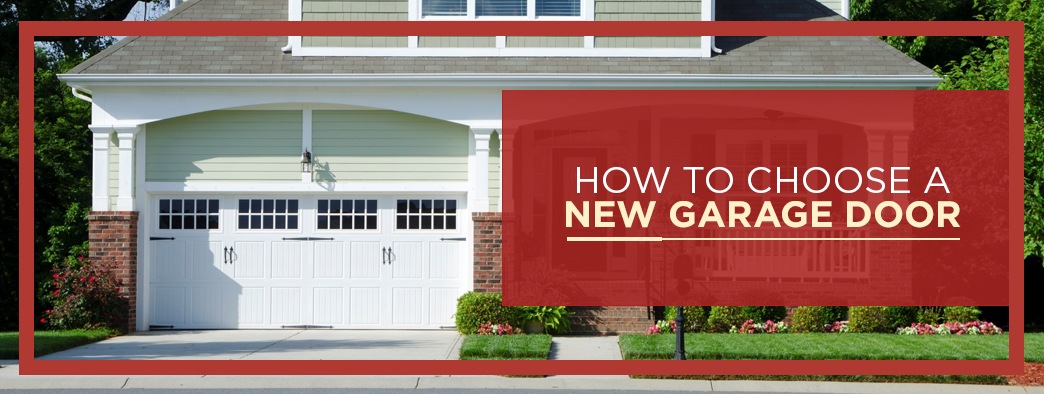
When it comes to choosing a new garage door, you have plenty of options. The decision comes down to which option best fits your home’s needs.
Some factors to consider when selecting a door include garage door style, materials, windows vs. no windows, insulated vs. non-insulated and the type of door opener you want. If you’re don’t know what you should look for when choosing a new garage door, read below to find tips from A Better Door.
Garage Door Styles
There are several different styles of garage door to choose from, including:
- Sectional style: Sectional style is the most common type of garage door. Sectional style doors are broken into separate sections, which are held together with hinges. The hinges allow the door to bend and move as it is opened and closed. Because they are so common, sectional style garage doors are available in several different materials and designs.
- Carriage style: Carriage style is a classic type of garage door that resembles the style door found in traditional horse barns. Originally, carriage style garage doors were equipped with handles and opened outward. Many garage doors still open this way. However, homeowners now have the option to have carriage style doors that operate like modern garage doors instead.
- Roll-up style: Roll-up style garage doors coil upward when opening.
Single Door vs. Double Door
If you need a little more space in your garage, you have two options to consider — two single doors or one double door.
Two single doors:
- Reduce the amount of cold or hot air that enters your garage
- Are visually appealing
- Leave no room for a third car
- Need double the maintenance
- Require the purchase of a second garage opener, which could be costly
One double door:
- Provides more space inside your garage, specifically for homeowners who use car seats or wheelchairs
- Requires only one opening mechanism
Also, with one double door, all of your household’s cars will be trapped behind the same door in the event of a door malfunction.
Garage Door Materials To Choose From
When selecting the material for your garage door, you have a choice between wood, composite wood, fiberglass, steel, aluminum, vinyl and glass. What is the best material for a garage door? The answer depends on the qualities and features that matter most to you.
Wood
Wooden garage doors provide a warm, rustic touch of style to any home. They are available in two different material makeups — real wood and composite wood.
- Real wood: Popular wood options include cedar, fir and redwood. Real wooden doors are heavy and durable. They are designed by craftsmen and may be customized with different stains or grain options. They are more insulated than composite wood doors.
- Composite wood: Composite wood doors imitate the appearance of wood, but are lighter and less durable. However, they do require less maintenance than genuine wood doors. The initial cost of composite wood doors is also more budget-friendly.
Steel
Steel is strong, durable and dent-resistant. They easily protect the interior of your garage from noise or weather. Steel garage doors also provide a lot of insulation and are available in a range of prices.
Vinyl
Vinyl doors are affordable and easy to maintain. They can be customized to fit a variety of styles and colors — however, once a vinyl door is installed, it is challenging to change its appearance.
Glass
Glass doors can be a chic style choice for any modern home. They let plenty of natural light into your garage and require no exterior paint to maintain. Glass garage doors can be frosted or mirrored, allowing for more privacy.
Glass doors are often relatively expensive, and although they are designed to withstand the elements, they do not provide insulation.
The Pros and Cons of Garage Door Windows
Another choice you have is whether you want your garage door to have windows. While garage doors with windows are attractive, they have their pros and cons:
Pros: Some of the benefits of windows for garage doors are that they:
- Are aesthetically pleasing
- Let in natural light
- Can coordinate well with the windows in your home
Cons: However, windows also:
- Are more expensive
- Can be breakable
- Offer less privacy
Insulated vs. Uninsulated Garage Doors
As we learned above, some garage door materials, like real wood and steel, are natural insulators.
Other materials can have insulation added to them.
If you’re considering whether to choose a garage door with or without insulation, consider these factors. Insulated garage doors:
- Reduce noise pollution
- Are energy-efficient
- Are more sturdy and durable
- Are more expensive than non-insulated doors
If your garage is above a living space, you may want to consider choosing a door and/or material that provides insulation.
Types of Garage Door Openers
When selecting your garage door opener, there are three main types of garage door openers to choose from, and they are:
- Chain drive openers: Chain drives are the most common type of garage door opener. They operate using a chain that connects the trolley to a motor, which pulls the door open or closed. Chain drive openers are strong and reliable, though often noisy. They are ideal for detached garages. Chain drive openers are budget-friendly.
- Belt drive openers: Belt drive openers operate similarly to a chain drive opener, but use a rubber belt instead. For this reason, operation is quieter.
Wi-Fi or Smart Garage Door Openers
Wi-Fi-powered openers — also known as smart openers — are relatively new to the garage door scene, but homeowners enjoy their benefits. In 2017, 74% of consumers said they would repurchase their Wi-Fi-powered garage door opener.
Some benefits of a WiFi-enabled garage door opener include:
- The ability to open and close your garage door while away from home
- Push notifications on your cell phone alerting you anytime your garage door is opened — some smart openers will even show you the person entering or exiting the garage
Let A Better Door Company Help You Choose the Best Garage Door for Your Home
A Better Door Company is here to answer all your garage door questions. We are a family-owned business specializing in residential and commercial overhead garage door sales, installation and repair throughout Suffolk and Nassau counties in Long Island, New York. Browse our residential garage doors online.




